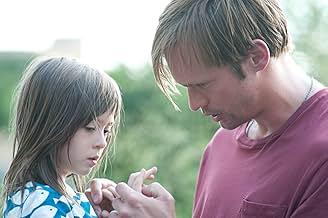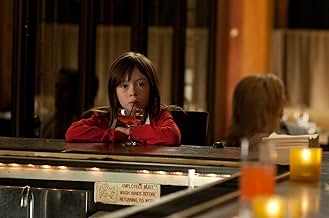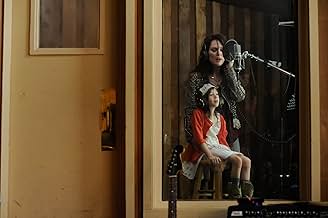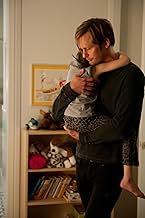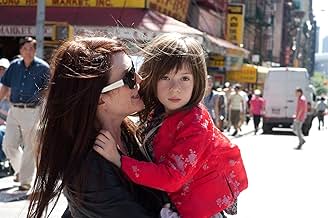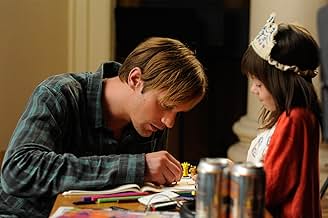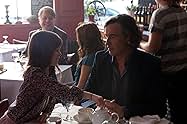VALUTAZIONE IMDb
7,4/10
28.988
LA TUA VALUTAZIONE
A New York City, una giovane ragazza viene colta nel mezzo dell'aspra battaglia per la custodia dei suoi genitori.A New York City, una giovane ragazza viene colta nel mezzo dell'aspra battaglia per la custodia dei suoi genitori.A New York City, una giovane ragazza viene colta nel mezzo dell'aspra battaglia per la custodia dei suoi genitori.
- Regia
- Sceneggiatura
- Star
- Premi
- 3 vittorie e 8 candidature totali
Jesse Stone Spadaccini
- Martin
- (as Jesse Spadaccini)
Diana García
- Cecelia
- (as Diana Garcia Soto)
Recensioni in evidenza
It always amazes me when I see a really impressive child acting performance. This is one of an impressive collective of films where a young performer has been quite outstanding. But there is something of an important difference between this one and most others. While the likes of Tatum O'Neal (Paper Moon), Ivana Baquero (Pan's Labyrinth) or Haley Joel Osment (The Sixth Sense) were all brilliant, none of them were as young as Onata Aprile. When you consider that at her age she simply will be incapable of understanding all the nuances of the screenplay, it makes it all the more outstanding just how good she is. She doesn't really say a whole lot but her looks convey massive amounts of meaning. Her performance is so natural that it reminds me of kid's drawings – so unaffected, unpretentious and instinctive that adults can never faithfully replicate them. The acting by the entire cast here is top calibre but at times like this you cannot compete and Onata Aprile easily steals the show.
It's quite a disturbing story really. Maisie is a neglected child and it's not very pleasant seeing her be passed around from pillar to post being essentially disregarded. The view the film adopts is a child's one. We see Maisie peeking round corners, in the periphery watching, seeing but never fully comprehending but understanding more than she is given credit for. She seems to know more about right and wrong than her parents do, for example. They are in worlds of their own, ignoring their little girl in order to play out their own self-obsessed games. Steve Coogan and Julianne Moore are very good in these unsympathetic roles in which they make you understand why they are like the way they are without making us actually sympathise with them.
The film works so well because it's given such an unsentimental treatment. The story unfolds subtly and believably and it avoids saccharine. While Maisie's parents are the bad guys of the piece they're not really villains as such, just extremely poor parents and very selfish people generally. As it turns out, it's the parent's new partners who are left increasingly in charge of the little girl and they are slowly drawn towards each other too. Collectively they make for an actual workable and loving family unit. Both Alexander Skarsgård and Joanna Vanderham are also great as these much more sympathetic adults. Events ultimately progress to an ending that was upbeat without sacrificing believability; it's simultaneously inconclusive yet hopeful. I suppose one of the messages of What Maisie Knew is that what is important is what is best for the child, not what is convenient for blood parents.
It's quite a disturbing story really. Maisie is a neglected child and it's not very pleasant seeing her be passed around from pillar to post being essentially disregarded. The view the film adopts is a child's one. We see Maisie peeking round corners, in the periphery watching, seeing but never fully comprehending but understanding more than she is given credit for. She seems to know more about right and wrong than her parents do, for example. They are in worlds of their own, ignoring their little girl in order to play out their own self-obsessed games. Steve Coogan and Julianne Moore are very good in these unsympathetic roles in which they make you understand why they are like the way they are without making us actually sympathise with them.
The film works so well because it's given such an unsentimental treatment. The story unfolds subtly and believably and it avoids saccharine. While Maisie's parents are the bad guys of the piece they're not really villains as such, just extremely poor parents and very selfish people generally. As it turns out, it's the parent's new partners who are left increasingly in charge of the little girl and they are slowly drawn towards each other too. Collectively they make for an actual workable and loving family unit. Both Alexander Skarsgård and Joanna Vanderham are also great as these much more sympathetic adults. Events ultimately progress to an ending that was upbeat without sacrificing believability; it's simultaneously inconclusive yet hopeful. I suppose one of the messages of What Maisie Knew is that what is important is what is best for the child, not what is convenient for blood parents.
I've read five previously posted reviews of this film and see no reason to repeat what they've already said. I agree, for the most part, with the positive ones. And I suspect the negative ones were written by people whose established taste in movies should have steered them away from seeing this one in the first place.
What I'll add is, I guess, a mostly personal perspective. I've found that I am lately much more drawn to smaller, more deeply felt movies than to bigger, slicker, higher-production-value ones. To "What Maisie Knew," for example, than to "The Great Gatsby." Even though both source novels share a similar interior aesthetic, the treatment in the former stays inside the characters, where James focused the original (thus causing one of the previous reviewers' comments to the effect that "nothing happens" in the movie), while the latter (possibly because of Luhrmann's well-established directorial predilections)stays resolutely focused on the exterior spectacle and barely skims the surface of Fitzgerald's deeply rendered characterizations.
If you like smaller, more closely observed and deeply felt films, you'll like this one.
What I'll add is, I guess, a mostly personal perspective. I've found that I am lately much more drawn to smaller, more deeply felt movies than to bigger, slicker, higher-production-value ones. To "What Maisie Knew," for example, than to "The Great Gatsby." Even though both source novels share a similar interior aesthetic, the treatment in the former stays inside the characters, where James focused the original (thus causing one of the previous reviewers' comments to the effect that "nothing happens" in the movie), while the latter (possibly because of Luhrmann's well-established directorial predilections)stays resolutely focused on the exterior spectacle and barely skims the surface of Fitzgerald's deeply rendered characterizations.
If you like smaller, more closely observed and deeply felt films, you'll like this one.
10kcfl-1
This is what I hope Henry James would have written, were he alive today. The book is tough sledding, late James when he was dictating his novels (due to tendinitis), and there was no holding him back. At least one Harvard professor called him "the greatest American novelist," but this work is deservedly minor.
The movie was perfect, in the top 1% of all I've seen. The style was the antithesis of James, radical "showing" instead of "telling."
I think the title should have been "What Maisie SAW," but that's too titillating. What she knew or felt only her future therapist will learn. We do have a hint though when her father throws her mother's flowers away, and M explains, "He was allergic."
The movie was perfect, in the top 1% of all I've seen. The style was the antithesis of James, radical "showing" instead of "telling."
I think the title should have been "What Maisie SAW," but that's too titillating. What she knew or felt only her future therapist will learn. We do have a hint though when her father throws her mother's flowers away, and M explains, "He was allergic."
What Maisie Knew (2012)
A truly remarkable movie, filled with great acting, masterful editing and filming, and terrific writing. The basis of it all is the core here, a glimmering Henry James novel by the same title from over 100 years earlier. It's amazing how well the story holds up set in contemporary times, and changed in many necessary (and interesting) ways. What it keeps it going is the basic heartbreaking drama of a child tossed between two indifferent parents.
The mother might be seen as the main actor here, Julianne Moore, and this is the best I've ever seen her, I think. She gives a slightly fiery performance, and "slightly" is perfect, avoiding an overacting job suggested by her role as a slightly successful rock and roll star. She's terrifically awful and you come to hate her, appropriately.
The father (Steve Coogan) also puts in a sharp performance playing the lively, fun parent who is a selfish womanizer, hiding, sometimes, his flaws from his daughter. His relationship with the mother is not detailed very far because it is mostly one of distance and disdain. And mutual abuse.
The real star here is the girl, an utterly charming and beautifully effective actress, Onata, Aprile. She succeeds not by her delivery of great lines, but by her expressions. It's all because Henry James understood something delicate about children in these situations: they know what's going on and don't say it. And they also don't let it affect them because they simply can't afford to, or because they become hardened in some little ways, making them withdraw or act out. That Maisie maintains a delicious sweetness without playing the victim is quite remarkable, and Aprile is brilliant.
The secondary woman and man in the story are also terrific, and their roles grow as the movie grows. In fact, they become the sympathetic heart of things.
Pulling this together is the directing pair, McGehee and Siegel. This is their fifth movie together, and neither man has directed anything without the other. I've not seen any of the other four, but the reviews are middling to poor for all of them, so I'm not sure how far the novelty takes us. But it works here perfectly, making the complexity unfold quickly and coherently.
It's an ordinary drama on the surface, but let this one sink in over time. It's that good.
A truly remarkable movie, filled with great acting, masterful editing and filming, and terrific writing. The basis of it all is the core here, a glimmering Henry James novel by the same title from over 100 years earlier. It's amazing how well the story holds up set in contemporary times, and changed in many necessary (and interesting) ways. What it keeps it going is the basic heartbreaking drama of a child tossed between two indifferent parents.
The mother might be seen as the main actor here, Julianne Moore, and this is the best I've ever seen her, I think. She gives a slightly fiery performance, and "slightly" is perfect, avoiding an overacting job suggested by her role as a slightly successful rock and roll star. She's terrifically awful and you come to hate her, appropriately.
The father (Steve Coogan) also puts in a sharp performance playing the lively, fun parent who is a selfish womanizer, hiding, sometimes, his flaws from his daughter. His relationship with the mother is not detailed very far because it is mostly one of distance and disdain. And mutual abuse.
The real star here is the girl, an utterly charming and beautifully effective actress, Onata, Aprile. She succeeds not by her delivery of great lines, but by her expressions. It's all because Henry James understood something delicate about children in these situations: they know what's going on and don't say it. And they also don't let it affect them because they simply can't afford to, or because they become hardened in some little ways, making them withdraw or act out. That Maisie maintains a delicious sweetness without playing the victim is quite remarkable, and Aprile is brilliant.
The secondary woman and man in the story are also terrific, and their roles grow as the movie grows. In fact, they become the sympathetic heart of things.
Pulling this together is the directing pair, McGehee and Siegel. This is their fifth movie together, and neither man has directed anything without the other. I've not seen any of the other four, but the reviews are middling to poor for all of them, so I'm not sure how far the novelty takes us. But it works here perfectly, making the complexity unfold quickly and coherently.
It's an ordinary drama on the surface, but let this one sink in over time. It's that good.
She knew who really loved her and who cared for her...
She also knew that mummy and daddy were too busy arguing to notice that the pizza guy had arrived. "What Maisie Knew" practically opens mid-tirade and Maisie, a wide-eyed six- year old girl has heard it all before, she skips innocently through their art-deco New York apartment, past her none-the-wiser parents, pulls out a fistful of dollar bills from her own piggy-bank and returns to the door to pay for the pizza.
"What Maisie Knew" is a re-visioning of the 19th-Century Henry James novel by the same name. The story follows Maisie, played by the captivating Onata Aprile , caught in the midst of a custody battle between her aging rock star mother Susanna and art-dealer father, Beale.
Susanna intensely played by the always-brilliant Julianne Moore and Beale (Steve Coogan) only unite in their neglect and emotional abandonment of little Maisie, and both of whom are not above using their daughter as a pawn in their war game.
As they battle on with the messy custody arrangements, Beale marries former nanny Margo (Joanna Vanderham), and in retaliation Susanna also remarries, to young bartender Lincoln, (Alexander Skargard).
As Maisie moves between her parents now separate lives, we unearth a natural connection between Maisie and Lincoln. You feel safe when he is around, even though he doesn't know what he is doing half the time and like Maisie, is out of his depth and unsure where he stands in Susanna's life.
Constantly, Susanna relies on Lincoln to pick Maisie up from school, drop her off, and spend time with her and improvise when necessary. But as the affectionate bond between her new husband and her daughter grows, Susanna becomes jealous of the relationship to the point of enforcing to Lincoln "you don't get a bonus for making her like you".
"You don't deserve her," Lincoln lashes out as Susanna breaks up with him, expressing exactly what the viewer has been thinking. But as another relationship in Maisie's life ends, it's her resilience that keeps us captivated and in awe of such a brave girl.
The story is told from Maisie's perspective including many shots even captured from Maisie's eye level so we get a fresh look at an unoriginal story. Instead of finding out why a parent leaves her at school, we just see how the child remembers being left alone. Instead of knowing what the parents are fighting about, we see how it impacts the child and her memories of it.
"What Masie knew" is a bleak film but hopeful, it demonstrates that innocence is not something to be wasted and used but cherished and protected. What Masie knew is to trust the people who actually take care of her - never voicing an allegiance against anyone but accepting love when it's offered
She also knew that mummy and daddy were too busy arguing to notice that the pizza guy had arrived. "What Maisie Knew" practically opens mid-tirade and Maisie, a wide-eyed six- year old girl has heard it all before, she skips innocently through their art-deco New York apartment, past her none-the-wiser parents, pulls out a fistful of dollar bills from her own piggy-bank and returns to the door to pay for the pizza.
"What Maisie Knew" is a re-visioning of the 19th-Century Henry James novel by the same name. The story follows Maisie, played by the captivating Onata Aprile , caught in the midst of a custody battle between her aging rock star mother Susanna and art-dealer father, Beale.
Susanna intensely played by the always-brilliant Julianne Moore and Beale (Steve Coogan) only unite in their neglect and emotional abandonment of little Maisie, and both of whom are not above using their daughter as a pawn in their war game.
As they battle on with the messy custody arrangements, Beale marries former nanny Margo (Joanna Vanderham), and in retaliation Susanna also remarries, to young bartender Lincoln, (Alexander Skargard).
As Maisie moves between her parents now separate lives, we unearth a natural connection between Maisie and Lincoln. You feel safe when he is around, even though he doesn't know what he is doing half the time and like Maisie, is out of his depth and unsure where he stands in Susanna's life.
Constantly, Susanna relies on Lincoln to pick Maisie up from school, drop her off, and spend time with her and improvise when necessary. But as the affectionate bond between her new husband and her daughter grows, Susanna becomes jealous of the relationship to the point of enforcing to Lincoln "you don't get a bonus for making her like you".
"You don't deserve her," Lincoln lashes out as Susanna breaks up with him, expressing exactly what the viewer has been thinking. But as another relationship in Maisie's life ends, it's her resilience that keeps us captivated and in awe of such a brave girl.
The story is told from Maisie's perspective including many shots even captured from Maisie's eye level so we get a fresh look at an unoriginal story. Instead of finding out why a parent leaves her at school, we just see how the child remembers being left alone. Instead of knowing what the parents are fighting about, we see how it impacts the child and her memories of it.
"What Masie knew" is a bleak film but hopeful, it demonstrates that innocence is not something to be wasted and used but cherished and protected. What Masie knew is to trust the people who actually take care of her - never voicing an allegiance against anyone but accepting love when it's offered
Lo sapevi?
- QuizIn an interview on the NPR program "Fresh Air", Julianne Moore said that she drew on Courtney Love and Patti Smith for inspiration for her character in this movie, who is (like Love and Smith) a rock star who is also a mother.
- ConnessioniFeatured in At the Movies: Episodio #10.26 (2013)
- Colonne sonoreRockabye Baby
Performed by Julianne Moore
I più visti
Accedi per valutare e creare un elenco di titoli salvati per ottenere consigli personalizzati
Dettagli
- Data di uscita
- Paese di origine
- Siti ufficiali
- Lingua
- Celebre anche come
- What Maisie Knew
- Luoghi delle riprese
- The High Line, Manhattan, New York, New York, Stati Uniti(Maisie and Lincoln play at the High Line)
- Aziende produttrici
- Vedi altri crediti dell’azienda su IMDbPro
Botteghino
- Budget
- 6.000.000 USD (previsto)
- Lordo Stati Uniti e Canada
- 1.066.471 USD
- Fine settimana di apertura Stati Uniti e Canada
- 21.480 USD
- 5 mag 2013
- Lordo in tutto il mondo
- 2.711.379 USD
- Tempo di esecuzione1 ora 39 minuti
- Colore
- Mix di suoni
- Proporzioni
- 2.35 : 1
Contribuisci a questa pagina
Suggerisci una modifica o aggiungi i contenuti mancanti

Divario superiore
By what name was Quel che sapeva Maisie (2012) officially released in India in English?
Rispondi






